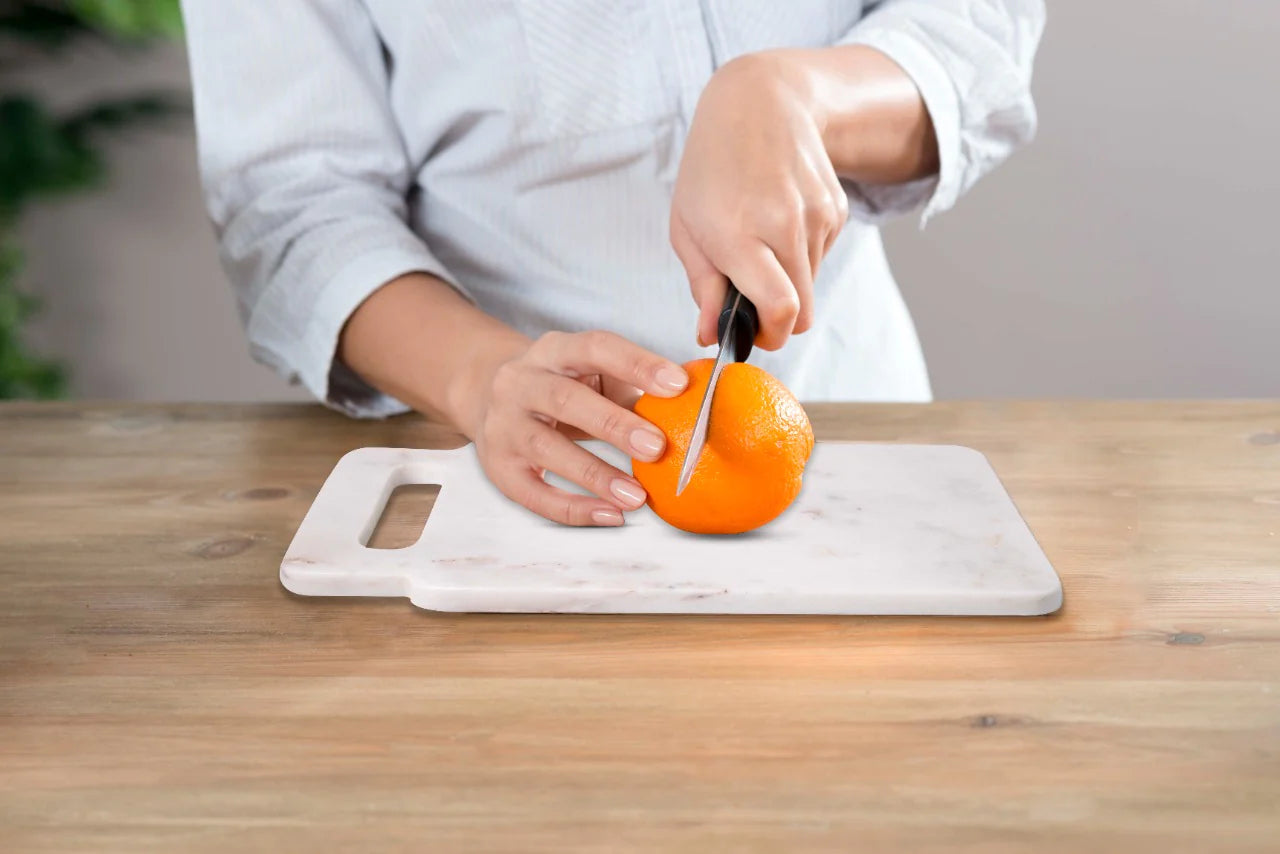All India Delivery
All India Delivery

Marble, a metamorphic rock formed from limestone, has been prized for centuries for its exquisite beauty and durability. However, the qualities that make marble so appealing extend beyond aesthetics and make it an excellent choice for food preparation. In this article, we will delve into the science behind marble chopping boards, exploring their unique properties and explaining why they are considered ideal for culinary endeavors.

One of the primary reasons marble chopping boards are favored in professional kitchens and households alike is their natural coolness. Marble possesses exceptional thermal conductivity, meaning it can quickly absorb and dissipate heat. This characteristic makes marble an ideal surface for handling ingredients that require low temperatures, such as pastry dough or chocolate. When working with these delicate ingredients, the cool surface of a marble chopping board helps to maintain the desired temperature and prevents them from becoming too warm and losing their consistency. This attribute is particularly advantageous in hot climates or when working in kitchens without air conditioning, as it helps to preserve the quality of ingredients and ensure the success of culinary creations.
Another significant benefit of marble chopping boards lies in their non-porous surface. The smoothness of marble prevents liquids, oils, and juices from seeping into the board, reducing the risk of bacterial growth and cross-contamination. Unlike wooden or plastic cutting boards, which may develop tiny grooves over time, marble remains relatively impervious to such damage. This non-porous characteristic not only enhances food safety but also simplifies the cleaning process. Bacteria and stains are less likely to penetrate the surface of a marble chopping board, allowing for easier maintenance and ensuring a hygienic food preparation environment.

Furthermore, marble's durability and hardness make it highly resistant to rooves and crevices, the dense nature of marble ensures a sturdy and resilient chopping surface. This durability not only prolongs the lifespan of the chopping board but also contributes to food safety. Deep grooves and crevices in cutting boards can harbor bacteria that are difficult to remove even with thorough cleaning. With a marble chopping board, you can confidently handle sharp knives without worrying about damaging the surface, and you can be assured of a clean and safe food preparation area.
The composition of marble also plays a role in its suitability for food preparation. Marble is primarily composed of calcium carbonate, which imparts a slightly alkaline nature to the stone. This alkalinity can help neutralize the acidity of certain foods, such as citrus fruits or acidic vegetables, which can potentially react with other types of cutting boards. The smooth and uniform surface of marble facilitates the easy movement of ingredients during chopping and cutting, allowing for precise and controlled movements. This attribute is particularly important when working with delicate ingredients that require precision, such as finely chopped herbs or vegetables.
Additionally, marble's aesthetic appeal should not be overlooked. Its natural patterns and colors can add a touch of elegance to any kitchen. Marble chopping boards are available in a variety of shades, ranging from classic white to striking black, allowing you to choose one that complements your kitchen decor. The visual allure of marble can elevate the overall ambiance of your cooking space and make food preparation a more enjoyable experience. Whether you are a professional chef or a home cook, the beauty of a marble chopping board can enhance your kitchen's aesthetic appeal and make it a focal point in your culinary endeavors.

To maintain the quality and longevity of your marble chopping board, proper care is essential. Avoid exposing it to extreme temperatures, as rapid changes can cause the stone to crack. Clean the surface with mild soap and warm water, ensuring thorough rinsing to remove any residue. It is advisable to dry the board completely after cleaning and periodically apply food-grade mineral oil to nourish the stone and enhance its natural luster. Proper care and maintenance will ensure that your marble chopping board remains in excellent condition for years to come.
In conclusion, the science behind marble chopping boards reveals their numerous advantages for food preparation. Their natural coolness, non-porous surface, durability, and alkaline composition make them an ideal choice for culinary enthusiasts. Whether you are a professional chef or a home cook, investing in a marble chopping board can enhance your cooking experience and elevate the safety and aesthetics of your kitchen. With its exceptional properties and timeless beauty, a marble chopping board is a valuable addition to any culinary space.
Leave a comment